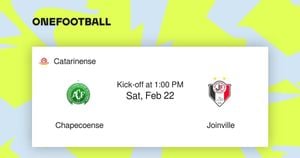The Brazilian government has officially launched its Pés-de-Meia program aimed at supporting students pursuing education degrees. Announced through communication channels from the Ministry of Education (MEC) on February 17, 2025, the program seeks to facilitate the academic journeys of students, offering monthly financial assistance as part of the broader initiative titled 'Mais Professores para o Brasil.' The urgency for investments in education, particularly for the new generation of teachers, cannot be overstated.
Eligible students can register for the program until March 30, and those who have been approved for public undergraduate education courses through the Unified Selection System (SISU), the University for All Program (PROUNI), or the Student Financing Fund (FIES) are invited to apply. Notably, students scoring above 650 on the National High School Exam (ENEM) taken last year also qualify. The importance of these financial incentives cannot be overlooked as they prepare students for teaching roles—a career widely recognized for its positive societal impact.
The financial aid provided through the Pés-de-Meia program amounts to R$ 1,050 monthly for successful candidates for the duration of their studies, potentially totaling over R$ 48,000 per recipient when considering all payments received throughout the course. The distribution of funds is structured with R$ 700 released for immediate access to students, and R$ 350 allocated to savings, accessible only after the new educators enter the public school system—a process they could initiate within five years of graduation.
Building on this new program, the Minister of Education, Camilo Santana, celebrated this initiative highlighting its significance: "Essa é uma grande vitória para a educação brasileira e um marco para o futuro do país. A decisão do TCU vai beneficiar milhões de alunos, garantindo que continuem seus estudos e tenham um futuro melhor" (This is a great victory for Brazilian education and a milestone for the country’s future. The decision from the TCU will benefit millions of students, ensuring they continue their studies and have a brighter future), as reported by Agência Brasil. This statement reflects the positive outlook from the minister and the government's confidence about ramping up educational support.
With funding of R$ 6 billion now cleared by the Tribunal de Contas da União (TCU), payments to high school students under the Pés-de-Meia program have also officially commenced. The commencement of these payments on February 20 will continue throughout the month, with allocations ranging from R$ 1,200 for eligible students who passed the ENEM or graduated from public high schools. Payments will be staggered based on the birth months of beneficiaries, ensuring systematic distribution for candidates qualified under these educational frameworks.
For those aiming to bridge the gap toward educational attainment, the creation of the Pés-de-Meia Licenciaturas program offers renewed horizons. The program aims to welcome approximately 12,000 students this year, contributing to the forecasted 2.3 million total beneficiaries across various associated educational initiatives.
A more detailed payment schedule has been released, indicating specific dates for financial distributions throughout the year. - January and February: February 20 - March and April: February 21 - May and June: February 24 - July and August: February 25 - September and October: February 26 - November and December: February 27.
Looking forward, the MEC also seeks to enforce consistent support for students who maintain attendance records, introducing the Incentive Frequência. This initiative rewards learners with 80% attendance levels, enhancing engagement and commitment toward education.
When assessed holistically, the Pés-de-Meia program signifies more than just monetary aid; it embodies Brazil’s commitment to nurturing future educators, enhancing the country’s teaching talent, and recognizing the value of education to societal well-being. Students stand on the brink of opportunity with these programs, encouraged not only through financial means but also with heartfelt recognition of their potential as future educators.



